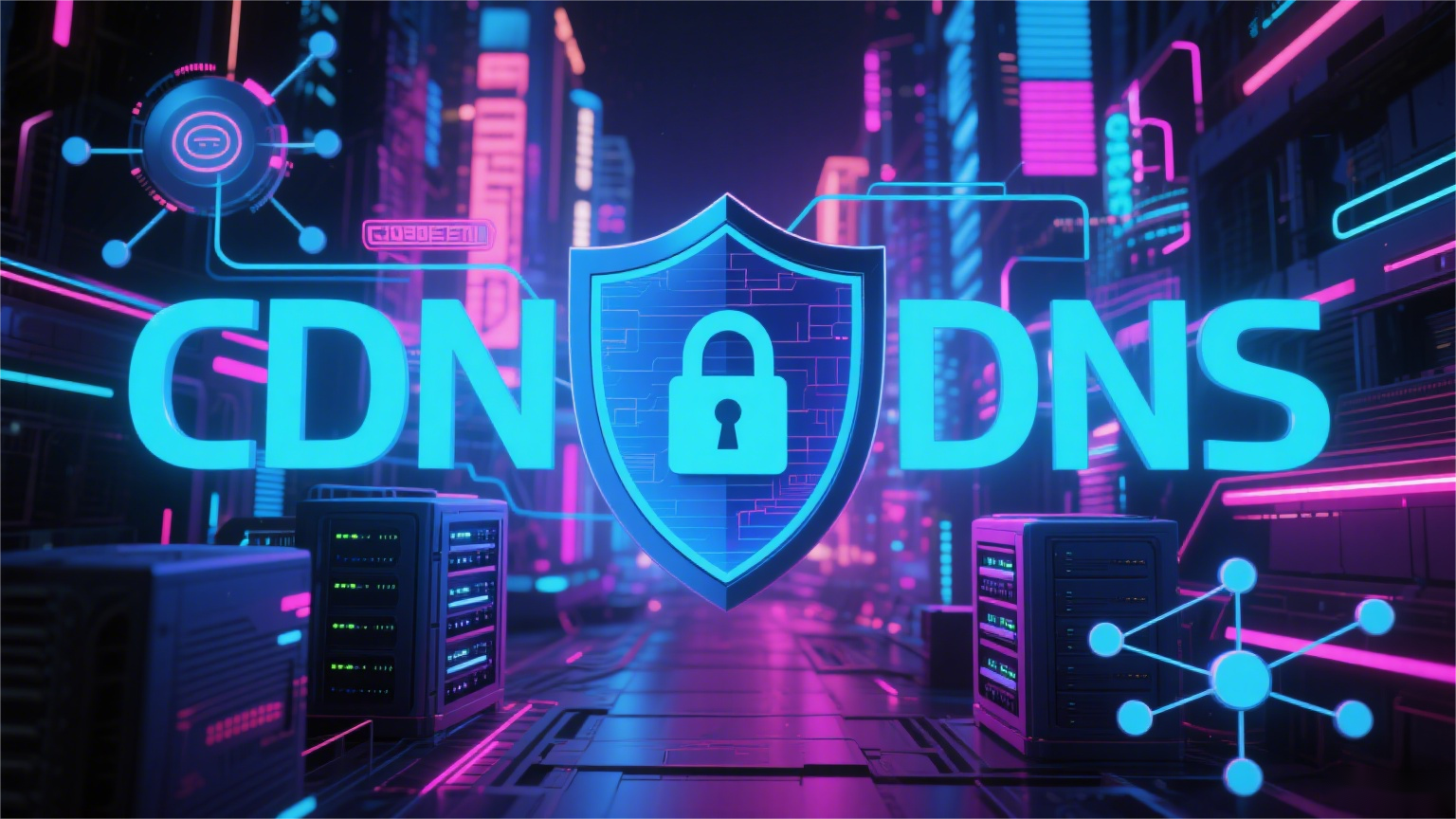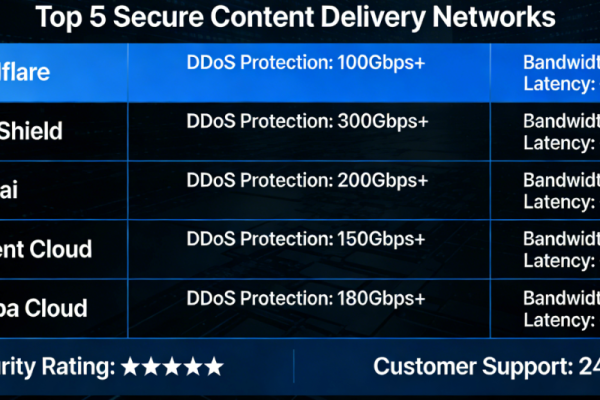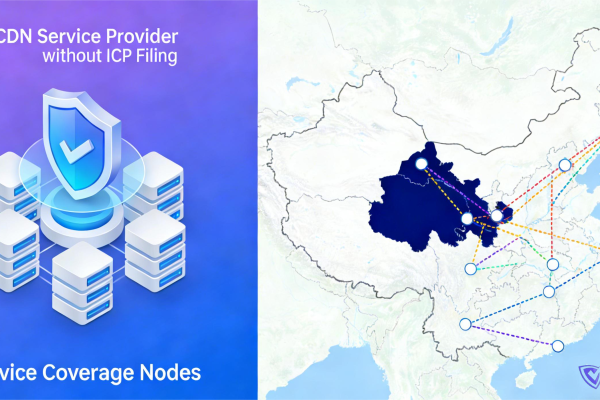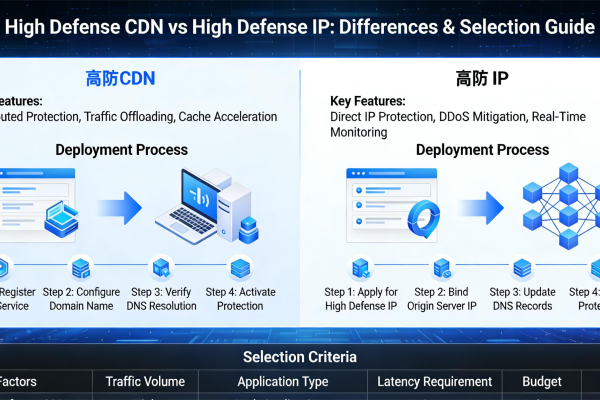Analysis of the difference between high-defense CDN and DNS protection and their core protection strategies
To put it simply and crudely: the core of DNS protection is to ensure that your "domain name translation system" is not paralyzed or tampered with; the core of high-defense CDN is to ensure that your "website content" can withstand flood-like attacks and can be quickly delivered to users.

First, the core question: What exactly do these two protect, and where do they protect it?
Think about it—when you access a website, there are actually two key steps involved:
Step one: You type a URL into your browser, for example, `www.yourstore.com`. This needs to be translated into the server’s real IP address, and the “translator” for this job is DNS.
Step two: Once the real address is found, your request actually heads toward the server (or server cluster) that stores your website content. At this point, the one handling heavy traffic and defending against attacks is primarily the high-protection CDN.
So, to put it simply: DNS protection is about keeping your “domain name translation system” from going down or being tampered with; high-protection CDN is about making sure your “website content” can withstand flood-like attacks and be delivered quickly to users.
DNS Protection: Guarding Your Website’s “Phonebook” and “Guide”.
Imagine your DNS server as the global switchboard for your website’s address book. Hackers love to do things like:
1. DDoS attack on the switchboard: Bombard it with endless nuisance calls (massive query requests) until it’s overwhelmed (resources exhausted), making it impossible for anyone to find your store’s real number (IP). Naturally, users can’t “find the server.”
2. DNS hijacking/poisoning: Even sneakier—they tamper with your address book so that visitors intending to reach your store get sent to phishing or malware sites instead, essentially robbing them while making them think they’re helping.

The core strategies of DNS protection focus on countering these two threats:
First, using a traffic scrubbing center (often Anycast-based and deployed at multiple points) to intercept and filter out massive junk queries before they reach your vulnerable core DNS server—only clean queries get through.
Second, strengthening the DNS protocol’s own security, such as enabling DNSSEC (adding digital signatures to prevent tampering) and setting strict rate limits to make it harder for attackers to forge responses or exhaust resources.
High-Protection CDN: Building a Global “Bulletproof Delivery Network” and “Traffic Diversion Moat”.
A CDN’s main job is to cache your site’s static content (images, CSS, JS, videos, etc.) on nodes closest to users worldwide, making page loads blazing fast.
But a “high-protection” CDN emphasizes the “protection” part. It mainly counters massive direct attacks on your origin server, such as DDoS and CC attacks (application-layer floods).
The core defense strategies are “distributed load handling” and “intelligent traffic scheduling”: First, a massive global edge node network acts as a huge buffer and shield.
Attack traffic hits these globally distributed CDN nodes first, where the enormous bandwidth and processing capacity dilute, absorb, and filter it. Then, smart routing and load balancing take over.
The CDN can analyze traffic in real time, identify malicious requests, and send them to a “blackhole” or scrubbing center, while routing legitimate user requests along the fastest, least congested paths to your origin server.
Additionally, high-protection CDNs often include a Web Application Firewall to block complex application-layer attacks like SQL injection and XSS (CC attacks fall into this category).
Finally, they can hide your origin server’s real IP! Users and attackers only see the CDN node IPs, keeping your server safely behind the scenes.
So, what’s the difference? Let’s compare:
With only a high-protection CDN, if your DNS is taken down, users won’t even know where your store is—your CDN power is useless.
With only DNS protection, if attackers flood your origin server directly, even the fastest DNS resolution will lead users to a “page cannot be displayed.”
Therefore, if you want peace of mind—especially for larger-scale operations—you need both, and both should be high-protection level.
DNS protection ensures users can “find the door,” while high-protection CDN ensures they can “get through the door” with a smooth and secure experience.
It’s like running a store—DNS protection keeps the sign lit and the address correct; high-protection CDN ensures the door is sturdy, the inside spacious and welcoming, and there’s security to keep trouble away.
In the US, especially if you’re running an online business, never take security lightly.
Cybercriminals are highly professional and always target the easiest prey.
Understanding and properly setting up both DNS protection and high-protection CDN is like giving your business double insurance.
Don’t wait until you’re under attack to act—by then, the damage won’t just be financial; losing user trust is even harder to recover.
Hopefully, this experience can serve as a wake-up call and help you avoid costly pitfalls!
Share this post:
Related Posts

Hong Kong High-Defense CDN Recommendations (2026 Latest Edition)
Not all Hong Kong high-defense CDNs can withstand attacks. This article compares the protection stre...

No-ICP CDN Recommendations | Which Ones Actually Speed Up Mainland China AND Can Withstand Attacks?
How to choose a no-ICP CDN? Based on real webmaster tests, this article compares multiple CDN provid...

What's the Difference Between DDoS-Protected CDN and DDoS-Protected IP? A Clear Guide to Help You Choose.
What's the difference between a DDoS-protected CDN and a DDoS-protected IP? Which one should your we...
